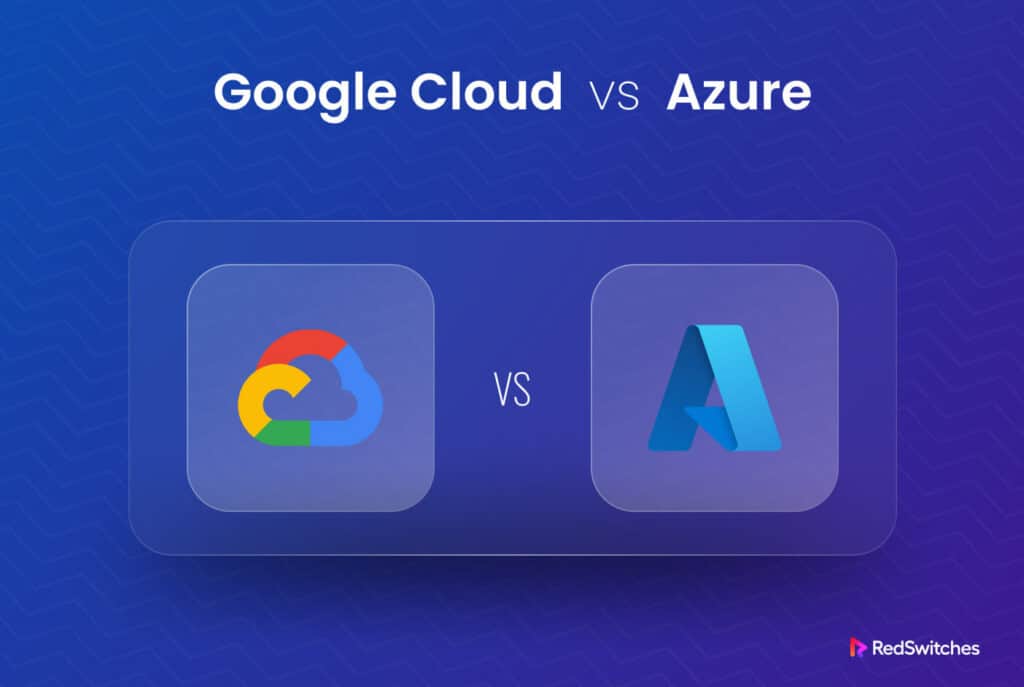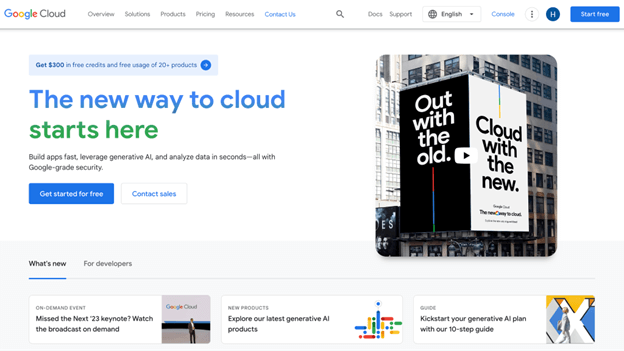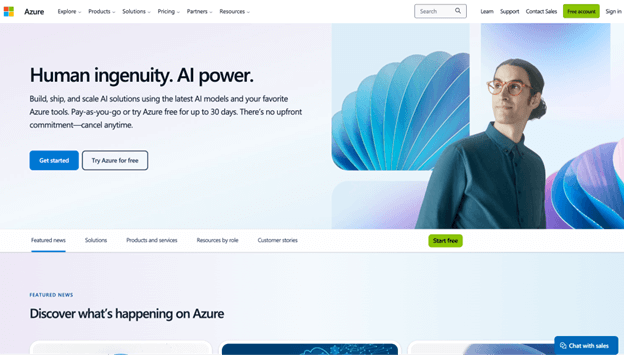Our technological landscape is currently advancing at an exponential rate. The development of cloud technology and tools has primarily driven this. Recent studies have shown that the value of the global cloud computing market is expected to surpass $1 trillion by 2028. Most businesses usually evaluate Google Cloud vs Azure among the wide range of cloud providers.
This paradigm shift has ushered in new opportunities for enhanced efficiency, agility, and scalability for modern businesses. Cloud computing can potentially transform application deployment and service management processes completely. Therefore, choosing between cloud services can be the primary foundation for your business’s future.
This article will help your business understand the differences, strengths, and limitations of Google Cloud vs. Microsoft Azure. This will help you navigate the cloud landscape with precision and flexibility. Selecting a cloud provider that aligns with your business’s needs will help you shape the trajectory of your digital journey.
Table of Contents
- What Is Cloud Computing?
- What is Google Cloud?
- What Is Microsoft Azure?
- Google Cloud vs. Azure Features Comparison
- Choosing Between Google Cloud and Microsoft Azure
- Final Takeaway
- FAQs
What Is Cloud Computing?
Before highlighting the intricacies of specific cloud platforms, your business must genuinely understand cloud computing. At its core, cloud computing is an emerging methodology that has redefined how businesses leverage technology.
It has revolutionized data storage and processing strategies by removing the limitations of local devices and servers. Cloud computing relies on a network of remote servers connected through the internet.
Benefits of Cloud Computing
1) On-Demand Scalability: One of the most significant advantages of cloud computing is its ability to provide users with on-demand scalability. Traditional hosting methods usually require businesses to overprovision resources to meet peak demands. However, this can often lead to underutilized or wasted resources during slower demand periods.
Cloud computing eliminates this problem by allowing users to scale resources up or down when needed. This flexibility and elasticity can enable your business to quickly adapt to changing workloads and optimize resource allocation. This can reduce the need for significant capital investment for static infrastructure.
2) Diverse Deployment Models: Different businesses may have unique requirements. Therefore, there are numerous deployment models available to accommodate these needs. This includes public, private, and hybrid clouds.
Resources are shared among multiple users in a public cloud through a third-party cloud provider. This is a cost-effective option for businesses with a wide range of different applications. A private dedicated server is usually used for a single organization. This option is ideal for companies with strict compliance and security requirements. A hybrid cloud infrastructure can combine the benefits of public and private clouds.
3) Efficient Primary Service Models: Cloud computing offers three primary service models, each streamlining specific IT aspects. This includes Software as a Service (SaaS), Platform as a Service (PaaS), and Infrastructure as a Service (IaaS).
SaaS can eliminate the need for local software installations by allowing users to access software applications over the internet. PaaS can provide developers with pre-built tools and frameworks to build, test, and deploy applications. IaaS provides users with virtualized computing resources over the cloud, such as networking, storage, and machines.
What is Google Cloud?
Credit: Google Cloud
Google Cloud (GCP) is a robust and versatile cloud platform that can provide businesses and users with robust services and solutions. It is equipped with powerful functionality that can be tailored to meet the needs of various industries. When evaluating Google Cloud Platform vs. Azure, there are vital features that can make it an ideal choice for digital transformation.
Key Features
One key feature of Google Cloud is its efficient and flexible virtual machines. These are like supercharged computers that can manage numerous tasks and adapt to different workloads. They form the backbone of Google Cloud’s infrastructure by facilitating optimal performance for various tasks.
When evaluating Google Cloud vs Azure, you must consider compatibility with different programming languages. One of the key features of Google Cloud is its extensive support for other programming languages. Creating an environment accommodating seamless innovation can be especially useful for software developers.
Google Cloud is also famous for its scalability. Its extensive architecture is designed to cater to various businesses of all sizes. Therefore, it can scale up or down to meet dynamic and evolving needs and requirements. Another key advantage of Google Cloud is its seamless integration with other Google services and tools. This can provide your business with a holistic and comprehensive cloud solution that can be integrated with other tools. This includes analytics and machine learning.
Who Uses Google Cloud?
When comparing Google vs. Microsoft Cloud Services, it is essential to understand their real-world impact.
Google Cloud has demonstrated its flexibility and reliability across numerous different industries. This includes providing healthcare providers with cutting-edge data analytics and enabling E-commerce businesses to handle surges in online shopping.
Industry leaders such as Spotify, Walmart, and Pfizer leverage the power of Google Cloud to empower innovation and digital transformation. This represents the diverse and versatile capabilities of Google Cloud and its ability to provide tangible value.
What Is Microsoft Azure?
Credit: Microsft Azure
Microsoft Azure stands out as a highly robust and multi-faceted cloud platform. They can provide users with extensive tools and services to empower businesses on digital journeys. When choosing between Microsoft Azure vs Google Cloud, you must consider the features that shape Azure as a unique asset.
Key Features
Microsoft Azure has numerous features that make it an ideal option when evaluating Microsoft Cloud vs. Google Cloud.
- Azure provides users with a variety of virtual machines (VMs) that are optimized for varied workloads. This includes general-purpose, memory-optimized, and GPU instances.
- Azure’s Hybrid Benefits program also allows users to reduce VM investment by leveraging existing Windows Server licenses.
- Azure’s App Service will enable users to develop, host, and scale enterprise applications and APIs efficiently. It supports various programming languages such as PHP, Java, and more.
- Azure Functions is a serverless computing solution that allows businesses to run specific code in response to different events. This can simplify the development of event-driven applications and support other programming languages.
- Azure also provides users a suite of DevOps tools and services for software development, testing, and deployment. This includes Azure DevTest Labs, Azure Kubernetes Service (AKS), and Azure DevOps Services.
Who Uses Microsoft Azure?
The reach of Microsoft Azure extends a broad spectrum of different industries and businesses. Therefore, it is a popular and reliable choice for various industries. Therefore, when choosing between Google Cloud and Azure, it is crucial to understand the different businesses using it. Organizations like the American Cancer Society, Heathrow Airport, and more have leveraged Axure to fuel their operations.
Azure has helped the American Cancer Society support innovative research and data-driven healthcare initiatives. LaLiga, a famous football league, uses Azure to enhance engagement by building user-friendly digital experiences. Similarly, the NBA uses Azure’s functionality to engage with fans across the globe. Heathrow Airport relies on Azure to streamline operations and promote passenger safety.
Google Cloud vs Azure Features Comparison
This section will help you explore the different features and tools of Google Cloud vs Azure. You can select the right Platform for your specific needs and preferences by clearly understanding their various capabilities.
Credit: iStock
VM Features, Access, & Types
Regarding virtual machines (VMs), Google Cloud vs Azure both provide many beneficial options. Each is specifically designed to cater to a diverse range of organizational commuting needs. These VMs are primarily categorized based on CPU, memory, and storage parameters. This lets users precisely match their cloud resources to specific workloads and tasks.
For example, Google Cloud provides users with various machine types that are finely tuned for different computing tasks. Azure provides users with all-encompassing general-purpose VMs equipped with the flexibility to align with the specific requirements of other applications.
Linux-based VMs are usually accessed with the Secure Shell (SSH) protocol, ensuring advanced security during remote connections. Google Cloud and Azure provide browser-based SSH access, simplifying management workloads through an accessible web interface.
Locations
Google Cloud vs Azure both have an expansive and extensive global network that ensures accessibility across different geographical regions.
Google Cloud has an established presence across 35 regions, 200 countries, and 60 availability zones. These availability zones are strategically distributed worldwide. This enhances reliability, scalability, and redundancy for all users, regardless of geographical region. Azure also offers an extensive cloud infrastructure that serves 58 regions and 140 availability zones.
This can ensure that users can access cloud resources with low latency access globally.
CDN
Content Delivery Networks (CDNs) are vital in enhancing the performance and reliability of cloud-based applications and solutions.
Google Cloud CDN is designed to reduce load times, conserve bandwidth resources, and enhance the responsiveness of enterprise applications. It leverages Google’s existing expansive infrastructure to deliver content to users effectively. This can ensure that websites and applications load faster. One of the most beneficial features of Google Cloud CDN is its peering capability, allowing it to connect to different internet service providers directly.
Azure CDN is popular for its seamless integration with different Azure services. It can also help businesses optimize load times, conserve bandwidth, and enhance application responsiveness. Azure CDN can provide users with dedicated connections to prominent CDN providers such as Verizon and Akamai.
Therefore, businesses evaluating Google Cloud vs Azure must consider their indispensable CDN tools.
Dedicated Interconnection
Dedicated interconnection is one of the most important factors when analyzing Google Cloud vs Azure. It can be the foundation for ensuring efficient and secure communication between on-premises infrastructure and the cloud.
It is crucial to protect your business from potential security risks and vulnerabilities. It can provide a private, dedicated, direct link to the cloud provider’s infrastructure. This direct link eliminates risks associated with public internet access, resulting in increased reliability and security.
Azure and Google Cloud both recognize and prioritize the significance of dedicated interconnection. Azure’s ExpressRoute utilizes a hub-and-spoke network topology to allow businesses to connect numerous branch offices to the cloud. Google Cloud provides users access to Dedicated Interconnect- a tool that facilitates secure hybrid network implementations.
Credit: iStock
DNS
The Domain Name System (DNS) translates domain names into numerical IP addresses that can be used for telecommunication. This is the primary foundation for further online interaction. Therefore, it is an essential aspect that businesses must consider when selecting between Google Cloud vs Azure.
Cloud DNS ensures that domain name resolutions are fast, reliable, and highly secure. Cloud DNS utilizes and supports DNSSEC (Domain Name System Security Extensions). This is a suite of protocols that safeguards the security of the DNS and avoids potential threats.
Azure DNS also provides efficient domain name resolution. However, it lacks support for DNSSEC. The absence of this support may be a critical consideration for organizations with stringent security and compliance protocols.
Load Balancing
Load balancing is crucial for ensuring reliability and availability for enterprise applications and services being hosted in the cloud.
Google Cloud provides users with HTTP(S) load-balancing solutions that can intelligently distribute client requests across instances and regions. This can help optimize performance and maintain the availability of enterprise applications. It can enhance the responsiveness of applications and dynamically scale resources to meet traffic demands.
Azure also offers a highly effective HTTP(S) load-balancing solution that leverages powerful algorithms to distribute client requests. This can help distribute client requests evenly between application instances and ensure no instance becomes overwhelmed. Azure’s load balancer also supports SSL offloading.
Virtual Networks
Virtual networks are an essential aspect of any effective cloud infrastructure. They can allow users to create isolated and secure environments to be further segmented into subnetworks. This can ensure efficient resource management and robust security measures.
Azure is equipped with its mighty Virtual Network (VNet) service. It allows users to build isolated and customizable network topologies. They have powerful functionalities such as Virtual Network Peering and Network Security Groups (NSGs). This can help promote more secure communications and faster traffic routing.
Google Cloud’s Virtual Private Cloud (VPC) also provides users with similar network isolation and segmentation tools. One of the most notable features of Google Cloud is its shared networking. This means multiple projects operating on Google Cloud can share a common VPC. This can help your business accelerate network administration processes and enhance resource accessibility.
Credit: iStock
Tiers
Both Google Cloud vs Azure provide networking tiers that cater to different performance cost requirements. This can allow users to fine-tune their cloud infrastructure to meet their specific needs and preferences.
Google Cloud’s Premium tier stands out for its enhanced performance, low-latency networking, and efficient data transfer. This tier also includes value-added services such as enhanced application reliability and global load balancing.
Azure also provides a tiered networking option through its Virtual Network (VNet) service. The Azure Standard tier aligns closely with Google Cloud’s Standard deck by offering cost-effective services and expansive connectivity.
To further understand differences in latency and throughput between these tiers, your business can leverage performance measurements and insights from Cedexis.
Block Storage
Block storage can provide businesses the flexibility and scalability required to support extensive enterprise applications. When analyzing the differences between Google Cloud vs Azure, it is essential to understand their robust block storage features.
In Google Cloud, block storage is represented using Google Cloud Persistent Disks. These disks are available in different types of volumes, such as Standard and SSD. Each of these caters to users with varying requirements for performance.
Microsoft Azure offers Azure Disk Storage for all block storage needs. Azure Disks support unmanaged and managed modes, providing users with the flexibility to manage storage resources.
Distributed Object Storage
When considering distributed object storage solutions for Google Cloud vs Azure, it is crucial to understand the different features and terminology.
In Azure, objects are referred to as ‘Blobs’ while Google Cloud uses the term ‘Objects’ to represent stored data. Both platforms support various object types, allowing users to store various data formats. Both platforms offer robust object lifecycle management, allowing businesses to automate data retention and deletion policies.
This comprehensive understanding of distributed object storage will help you determine which Platform to choose for your needs and cost considerations.
Security
Security is a significant factor when evaluating Google Cloud vs Azure. Google Cloud and Azure utilize Fortinet, improving network security and threat protection. This tool can help optimize and protect your cloud environment against threats or vulnerabilities.
Google Cloud manages cloud resources through Identity and Access Management (IAM). It also utilizes robust mechanisms such as Advanced Encryption Standard (AES) with a 256-bit key to encrypt data. Azure is equipped with the Azure Active Directory to manage identity and access management. It also incorporates AES256 central key management for data encryption and conditional security access.
Credit: iStock
Support and Uptime
Reliable support and high uptime are crucial when deciding between Google Cloud and Azure.
Both providers offer access to extensive knowledge bases and extensive documentation. This can allow users to utilize valuable resources and troubleshoot issues independently. Furthermore, community support platforms enable businesses with a broader user community to seek solutions.
Google Cloud and Azure have a 99.99% uptime guarantee for most of their services. This level of availability and support can ensure that enterprise applications and mission-critical data are accessible when required.
AI and Machine Learning
Google Cloud and Azure are at the forefront of innovation in Artificial Intelligence (AI) and machine learning advancements.
Google Cloud is equipped with Vertex AI, a comprehensive platform that can help you streamline development and deployment processes. Your business can use this to navigate the complex landscape of machine learning.
Azure offers Azure Machine Learning, an all-inclusive machine learning service that can provide robust support. This includes processes such as management, model training, and deployment. Businesses building custom machine learning can utilize Azure’s ML.NET framework to operate seamlessly across platforms. This tool is perfect for helping you customize solutions to address unique business challenges.
DevOps and Application Monitoring
DevOps best practices and application monitoring are essential for helping your applications and services perform optimally. Azure and Google Cloud offer robust solutions to support these critical phases of cloud management.
Google Cloud’s Operations provide users with holistic monitoring, logging, and diagnostics tools. This can allow users to collect telemetry data and undergo proactive actions to ensure reliability and performance. This can also integrate extremely easily into other Google Cloud tools.
The Azure Monitor can also offer similar features and functionalities for real-time monitoring and managing infrastructure. This can provide valuable insights into application performance and automate reactive action to specific issues.
Credit: iStock
Migration Tools
Both Google Cloud and Microsoft Azure contain various powerful migration tools to expedite transitioning to their platforms.
Google Cloud provides ‘Migrate for Anthos,’ a tool designed explicitly for modernized application migration to containers. Their “migrate for Compute Engine’ can also simplify virtual machine migration, allowing businesses to move their VMs to Google Cloud. Their ‘Database Migration Service’ can facilitate efficient and smooth migration of databases.
Azure’s ecosystem contains the ‘Azure Migrate: App Containerization’ tool to promote simplified application migration. This is done by containerizing existing applications. This can also help your business use container orchestration platforms like Azure Kubernetes Service. The Azure Migrate: Server Migration and Azure Database Migration Service tools can simplify transitions and ensure minimal downtime.
Billing and Pricing
Understanding the billing and pricing models of Google Cloud vs Azure is one of the most critical phases of choosing a cloud provider. Pricing for cloud platforms depends on factors such as your requirements for storage, preferences for subscription models, and location-based pricing. Google Cloud and Azure offer highly competitive pricing plans tailored to specific use cases.
Both providers offer a pay-as-you-go pricing model. This means that users only pay for the specific cloud resource they consume. They also provide powerful cost management tools and options such as resource optimization recommendations and budget alerts.
Choosing Between Google Cloud and Microsoft Azure
Choosing between Google Cloud and Microsoft Azure is critical for any modern business.
Your business should consider sustainability efforts, available support and uptime, AI and ML capabilities, and database migration options. Their billing and pricing structure should align with your business’s budget and long-term scalability goals.
The choice between Google Cloud vs Microsoft Azure primarily depends on your organization’s unique preferences and requirements. This includes factors such as your current growth strategies and future objectives. Carefully evaluating these aspects of your business operations will help you make an informed decision and ensure a successful cloud adoption journey.
Final Takeaway
This comprehensive evaluation of Microsoft Azure vs. Google Cloud can give your business valuable insights. This analysis of their features, strengths, and capabilities can help you decide which service to select.
GCP and Azure provide users with robust and powerful tools for specific use cases. However, their choice ultimately depends on your particular business requirements and preferences. GCP is popular for its innovative machine-learning capabilities and data analytics tools. Therefore, it is an excellent choice for businesses prioritizing continuous innovation and deeper insights.
Azure stands out due to its extensive integration with Microsoft’s ecosystem and diverse client base. This makes it an ideal choice for users deeply integrated with other Microsoft tools and solutions.
As your business navigates the landscape of Google Cloud vs Azure, you must analyze the specific features of each Platform. This includes security, support and uptime, migration tools, billing and pricing, and more.
Premium Cloud Solutions with RedSwitches
Securing your cloud infrastructure should involve partnering with a trusted provider. Your business can leverage RedSwitches to enhance your overall cloud experience and journey.
RedSwitches is equipped with premium hosting solutions that can be integrated with industry leaders such as Azure, Google Cloud, and other environments. Our commitment to robust security, reliability, and high performance can help ensure your data is safe. This can allow your business to focus on achieving long-term growth and thriving in cloud environments.
Contact RedSwitches now to learn more about how your business can continue to achieve success in a cloud-centric landscape.
FAQs
Q1. Why use GCP instead of Azure?
Some users may prefer GCP over Azure due to an increased focus on machine learning and data analytics. GCP’s capabilities in these areas can facilitate continued digital transformation. Their robust containerization and Kubernetes support make it an ideal choice for businesses with containerized applications.
Q2. What is the difference between Cloud and Azure?
The Google Cloud Platform vs. Azure is a powerful and robust platform ideal for different use cases. They primarily differ regarding their strengths, services, features, and ecosystems.
Q3. Is Google cheaper than Azure?
The pricing model of Google Cloud and Azure may vary significantly. This typically depends on cloud resources, workload requirements, and geographic region.
Q4. Why is Google Cloud better?
Google Cloud is popular for its focus on data analytics, machine learning, and containerization. Its global network infrastructure and high-speed data transfer rates make it an extremely beneficial choice.
Q5. Which cloud is better to learn?
Google Cloud and Azure can provide users with extensive and highly beneficial learning opportunities. Therefore, your choice should align precisely with your long-term goals and scalability objectives.








